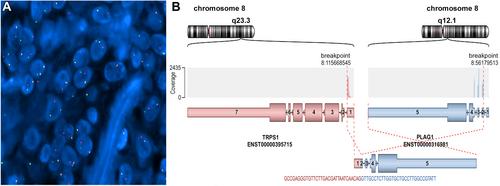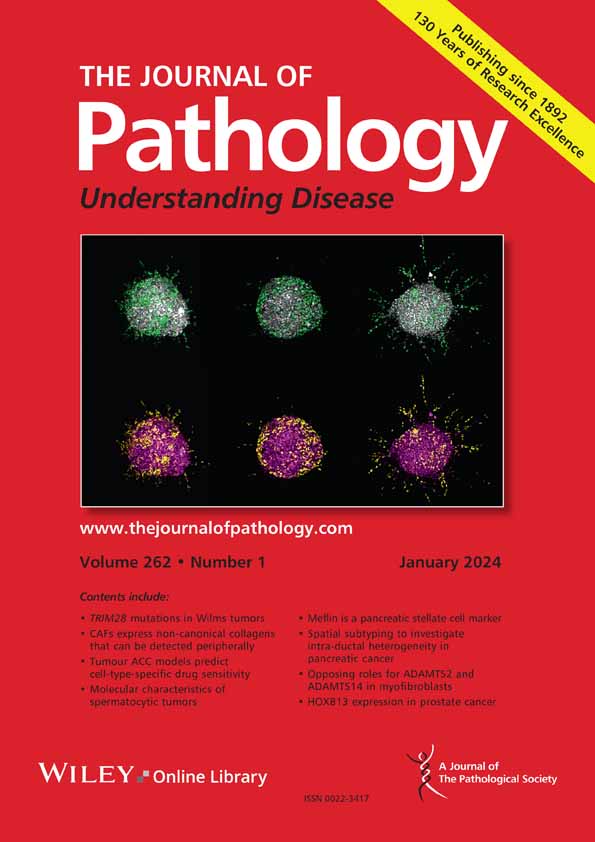下载PDF
{"title":"探索以 TRPS1::PLAG1 基因融合为特征的皮肤混合瘤的分子图谱。","authors":"Ziyad Alsugair, Marie Donzel, Nicolas Macagno, Juliet Tantot, Olivier Harou, Maxime Battistella, Pierre Sohier, Thibault Kervarrec, Arnaud de la Fouchardière, Brigitte Balme, Anne Champagnac, Marie-Delphine Lanic, Jonathan Lopez, Marick Laé, Françoise Descotes, Franck Tirode, Daniel Pissaloux, Brice Thamphya, Valérie Costes-Martineau, Nazim Benzerdjeb","doi":"10.1002/path.6359","DOIUrl":null,"url":null,"abstract":"<p>The histological similarities between pleomorphic adenomas (PAs) and cutaneous mixed tumors (CMTs) found in certain facial regions can create a diagnostic challenge. Molecular findings reveal common genetic profiles, particularly <i>PLAG1</i> rearrangements in both PA and CMT. Although molecular distinctions have received limited attention, our observations indicate multiple cases of CMTs carrying the <i>TRPS1</i>::<i>PLAG1</i> fusion. This clinical experience has driven our investigation into the potential diagnostic utility of <i>TRPS1</i>::<i>PLAG1</i> fusions for determining tumor origin. Two cohorts consisting of 46 cases of CMT and 45 cases of PA of the salivary glands were obtained from French institutions and reviewed by specialists in each subspecialty. RNA sequencing analysis was conducted to identify the molecular features of cases harboring <i>PLAG1</i>. Clinical, pathological, and molecular data were collected. In this study, cases of CMT exhibited recurrent gene fusions, primarily <i>TRPS1</i>::<i>PLAG1</i> (74%). These tumors shared characteristic histological features, including tubuloductal differentiation in 55% of cases and squamous metaplasia in varying proportions. In contrast, cases of PA had gene fusions involving <i>PLAG1</i> with various gene partners, with only one case in which <i>TRPS1</i>::<i>PLAG1</i> was identified. This disparity was also observed at the transcriptomic level between <i>TRPS1</i>::<i>PLAG1</i> CMTs and other tumors. However, TRPS1 immunostaining did not correlate with <i>TRPS1</i>::<i>PLAG1</i> fusion. In conclusion, we report that recurrent <i>TRPS1</i>::<i>PLAG1</i> fusion CMTs exhibit similar characteristic histological features, including tubuloductal differentiation that is associated with squamous metaplasia in around half of cases. Detection of this fusion could be valuable in correctly identifying the origin of these tumors. © 2024 The Pathological Society of Great Britain and Ireland.</p>","PeriodicalId":232,"journal":{"name":"The Journal of Pathology","volume":"264 4","pages":"448-456"},"PeriodicalIF":5.6000,"publicationDate":"2024-10-29","publicationTypes":"Journal Article","fieldsOfStudy":null,"isOpenAccess":false,"openAccessPdf":"https://onlinelibrary.wiley.com/doi/epdf/10.1002/path.6359","citationCount":"0","resultStr":"{\"title\":\"Exploring the molecular landscape of cutaneous mixed tumors characterized by TRPS1::PLAG1 gene fusion\",\"authors\":\"Ziyad Alsugair, Marie Donzel, Nicolas Macagno, Juliet Tantot, Olivier Harou, Maxime Battistella, Pierre Sohier, Thibault Kervarrec, Arnaud de la Fouchardière, Brigitte Balme, Anne Champagnac, Marie-Delphine Lanic, Jonathan Lopez, Marick Laé, Françoise Descotes, Franck Tirode, Daniel Pissaloux, Brice Thamphya, Valérie Costes-Martineau, Nazim Benzerdjeb\",\"doi\":\"10.1002/path.6359\",\"DOIUrl\":null,\"url\":null,\"abstract\":\"<p>The histological similarities between pleomorphic adenomas (PAs) and cutaneous mixed tumors (CMTs) found in certain facial regions can create a diagnostic challenge. Molecular findings reveal common genetic profiles, particularly <i>PLAG1</i> rearrangements in both PA and CMT. Although molecular distinctions have received limited attention, our observations indicate multiple cases of CMTs carrying the <i>TRPS1</i>::<i>PLAG1</i> fusion. This clinical experience has driven our investigation into the potential diagnostic utility of <i>TRPS1</i>::<i>PLAG1</i> fusions for determining tumor origin. Two cohorts consisting of 46 cases of CMT and 45 cases of PA of the salivary glands were obtained from French institutions and reviewed by specialists in each subspecialty. RNA sequencing analysis was conducted to identify the molecular features of cases harboring <i>PLAG1</i>. Clinical, pathological, and molecular data were collected. In this study, cases of CMT exhibited recurrent gene fusions, primarily <i>TRPS1</i>::<i>PLAG1</i> (74%). These tumors shared characteristic histological features, including tubuloductal differentiation in 55% of cases and squamous metaplasia in varying proportions. In contrast, cases of PA had gene fusions involving <i>PLAG1</i> with various gene partners, with only one case in which <i>TRPS1</i>::<i>PLAG1</i> was identified. This disparity was also observed at the transcriptomic level between <i>TRPS1</i>::<i>PLAG1</i> CMTs and other tumors. However, TRPS1 immunostaining did not correlate with <i>TRPS1</i>::<i>PLAG1</i> fusion. In conclusion, we report that recurrent <i>TRPS1</i>::<i>PLAG1</i> fusion CMTs exhibit similar characteristic histological features, including tubuloductal differentiation that is associated with squamous metaplasia in around half of cases. Detection of this fusion could be valuable in correctly identifying the origin of these tumors. © 2024 The Pathological Society of Great Britain and Ireland.</p>\",\"PeriodicalId\":232,\"journal\":{\"name\":\"The Journal of Pathology\",\"volume\":\"264 4\",\"pages\":\"448-456\"},\"PeriodicalIF\":5.6000,\"publicationDate\":\"2024-10-29\",\"publicationTypes\":\"Journal Article\",\"fieldsOfStudy\":null,\"isOpenAccess\":false,\"openAccessPdf\":\"https://onlinelibrary.wiley.com/doi/epdf/10.1002/path.6359\",\"citationCount\":\"0\",\"resultStr\":null,\"platform\":\"Semanticscholar\",\"paperid\":null,\"PeriodicalName\":\"The Journal of Pathology\",\"FirstCategoryId\":\"3\",\"ListUrlMain\":\"https://onlinelibrary.wiley.com/doi/10.1002/path.6359\",\"RegionNum\":2,\"RegionCategory\":\"医学\",\"ArticlePicture\":[],\"TitleCN\":null,\"AbstractTextCN\":null,\"PMCID\":null,\"EPubDate\":\"\",\"PubModel\":\"\",\"JCR\":\"Q1\",\"JCRName\":\"ONCOLOGY\",\"Score\":null,\"Total\":0}","platform":"Semanticscholar","paperid":null,"PeriodicalName":"The Journal of Pathology","FirstCategoryId":"3","ListUrlMain":"https://onlinelibrary.wiley.com/doi/10.1002/path.6359","RegionNum":2,"RegionCategory":"医学","ArticlePicture":[],"TitleCN":null,"AbstractTextCN":null,"PMCID":null,"EPubDate":"","PubModel":"","JCR":"Q1","JCRName":"ONCOLOGY","Score":null,"Total":0}
引用次数: 0
引用
批量引用



